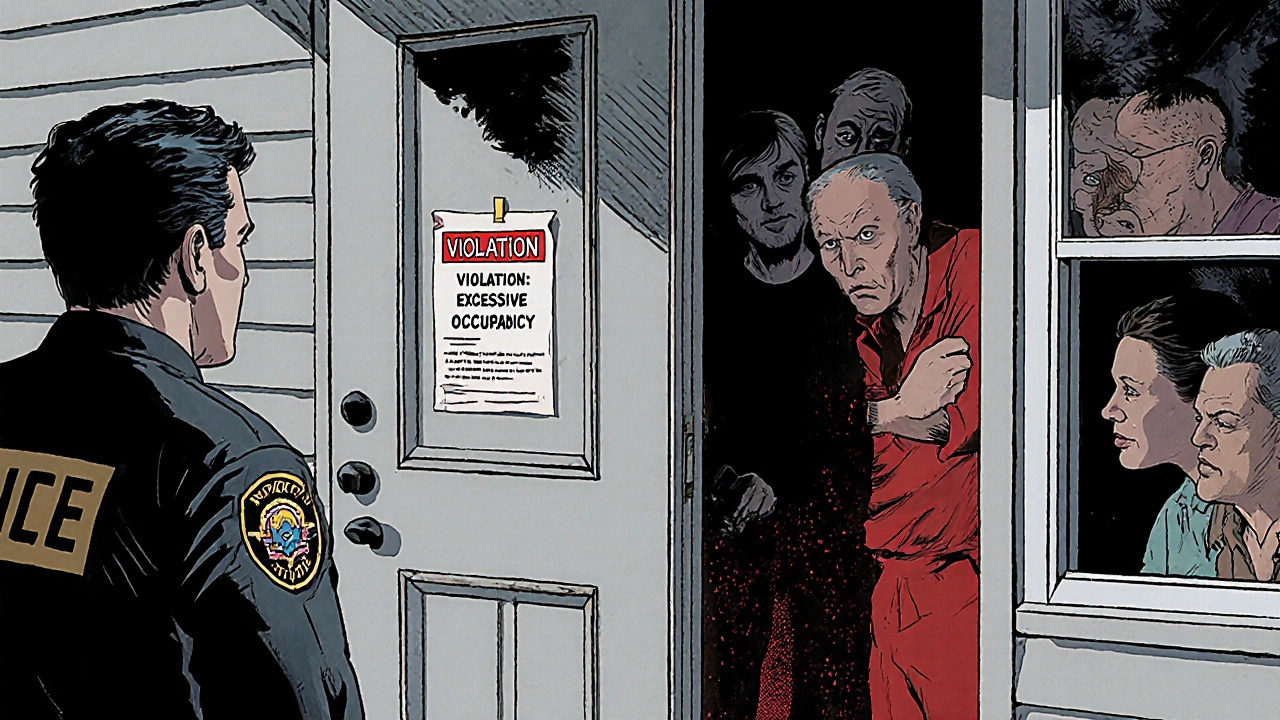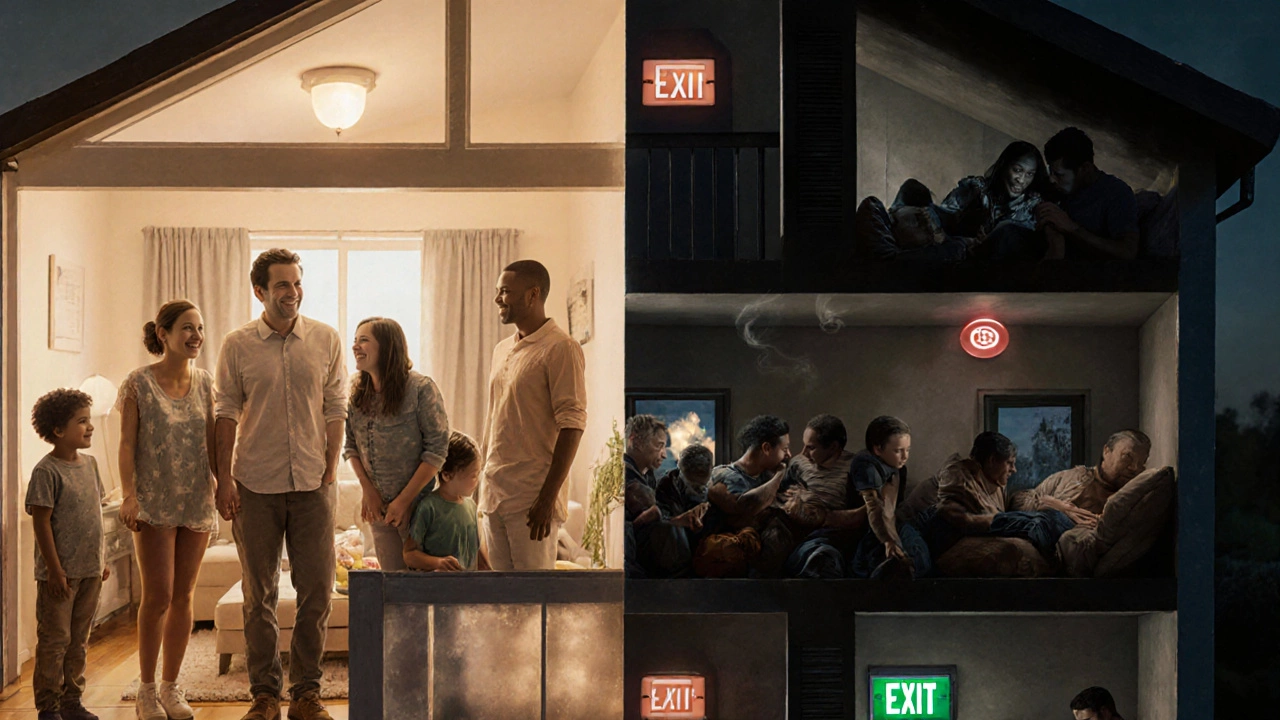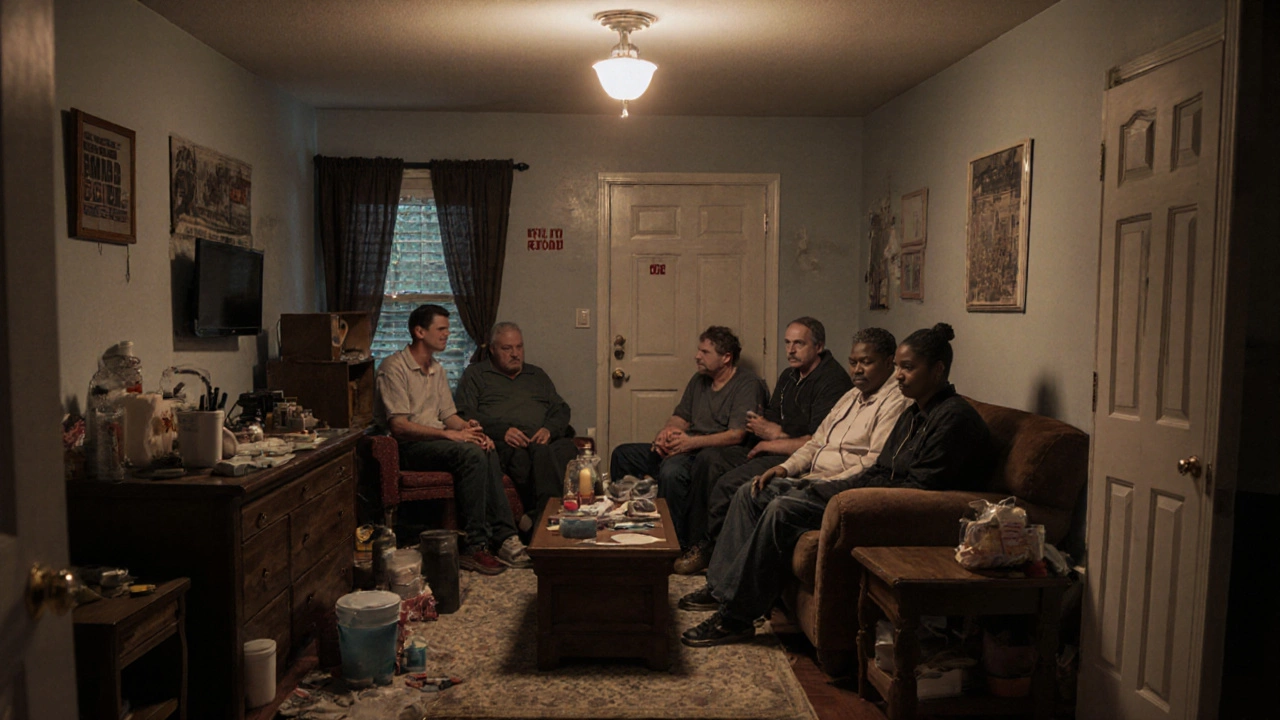Virginia Tenant Occupancy Calculator
Calculate Maximum Tenants
Enter your bedroom count and location to determine legal occupancy limits in Virginia.
There’s no single number that says how many tenants can live in a house in Virginia. It’s not like there’s a state law that says, "Five people max, no exceptions." Instead, it’s a mix of local rules, fire codes, and what your landlord puts in the lease. If you’re trying to cram eight people into a three-bedroom house in Richmond or share a two-bedroom apartment in Arlington with five roommates, you might be breaking the law-even if your landlord doesn’t care.
Virginia’s General Occupancy Rule: The Two-Person Standard
The state doesn’t set a hard cap, but most cities and counties follow what’s called the "two-person per bedroom" rule. That means a two-bedroom house can legally have up to four tenants. A three-bedroom house? Up to six. This comes from the U.S. Department of Housing and Urban Development (HUD) guidelines, which Virginia courts and local housing departments use as a baseline.
But here’s the catch: this isn’t a law written in stone. It’s a standard used to decide if housing is overcrowded under the Fair Housing Act. If a landlord refuses to rent to a family of five because they only have two bedrooms, that could be considered illegal discrimination. But if a group of six unrelated adults tries to move into a two-bedroom house, the landlord can say no-and they’re usually within their rights.
Local Rules Vary-Check Your City or County
Virginia lets cities and counties write their own occupancy rules, and they often go stricter than the two-person standard.
In Virginia Beach, the code says no more than three unrelated people can live in a single-family home unless they’re related by blood, marriage, or adoption. That means three roommates? Fine. Four? Not allowed, even if the house has four bedrooms.
Arlington County allows up to five unrelated people in a single-family home, but only if the home is certified as a "Group Living Facility" under their zoning code. Otherwise, the limit is three.
Richmond follows the two-person-per-bedroom rule, but adds a twist: if the house has a basement bedroom, it must have a legal egress window and meet safety codes. If it doesn’t, that room can’t count toward occupancy.
And in Charlottesville, any rental with more than four unrelated tenants requires a special use permit. That’s not just a formality-it’s a $250 application fee and a review by the city planning board.
What Happens If You Break the Rules?
If you’re living in a house with too many people, the consequences depend on who finds out.
Neighborhood complaints are the most common trigger. Someone calls the city’s code enforcement office, and an inspector shows up. They check for fire hazards, lack of bathrooms, blocked exits, or signs of structural strain. If they find violations, you’ll get a notice to fix it.
You might get:
- A warning to reduce occupancy within 30 days
- A fine of $100-$500 per day for each day you’re in violation
- A court order forcing you to move out
- For landlords: license suspension or revocation of rental permits
It’s not just about noise or parking. Overcrowding creates real safety risks. In 2023, a fire in a Norfolk rental with seven people in a two-bedroom house killed two. The investigation found blocked windows and no working smoke detectors. That’s why cities enforce these rules-they’re not just about quiet neighbors, they’re about saving lives.

Landlords Can Add Their Own Rules
Even if your city allows five tenants, your landlord can still say no. Virginia is a landlord-friendly state, and leases can include occupancy limits that are stricter than local law.
For example, a lease might say: "No more than four occupants, regardless of bedroom count." That’s legal. Courts have upheld these clauses as long as they’re clearly written in the lease and applied evenly.
But landlords can’t pick and choose. If they let one group of five move in but turn away another group of five because they’re a family with kids, that’s discrimination under the Fair Housing Act. The rule has to apply to everyone the same way.
What Counts as a "Tenant"?
Not everyone living in the house is counted the same way.
- Tenants: People named on the lease or rental agreement. They pay rent and have legal rights.
- Guests: People staying temporarily-like a cousin visiting for two weeks. Most leases allow 7-14 days of guests per month.
- Children under 18: Usually not counted toward occupancy limits if they live with their parents. But if a 20-year-old moves in with their 17-year-old sibling, they’re counted as an adult.
- Live-in caregivers: Some cities exempt them if they’re there for medical reasons.
So if you have two adults and three kids under 12 in a three-bedroom house, that’s typically fine. But if you have two adults, one 19-year-old, and three kids? That’s five people-and if your city only allows four, you’re over.

How to Find Your Local Rules
Don’t guess. Don’t rely on what your landlord says. Go straight to the source.
- Search for your city or county’s "housing code" or "occupancy ordinance" online.
- Look for terms like "maximum occupancy," "dwelling unit," or "family definition."
- Call your local building or code enforcement department. Ask: "What’s the maximum number of unrelated tenants allowed in a single-family rental?"
- Ask for a copy of the written code. Most cities post them online for free.
For example, if you’re in Lynchburg, type "Lynchburg VA occupancy code rental" into Google. The first result is the city’s municipal code, Section 12-21. It says: "No more than four unrelated persons may occupy a dwelling unit."
What If You’re a Landlord?
If you own rental property in Virginia, here’s what you need to do:
- Know your city’s occupancy limit and write it into every lease.
- Don’t allow more people than the code allows-even if tenants offer to pay extra.
- Require all adult occupants to be named on the lease. This gives you legal standing to evict if they violate the rules.
- Install smoke detectors and carbon monoxide alarms in every bedroom and common area. Many violations start with safety issues.
- Keep records of inspections and tenant applications. If you’re ever challenged, you’ll need proof you followed the rules.
One landlord in Roanoke lost his rental license in 2024 after a tenant died in a fire. The house had six people in a three-bedroom unit. The city found he’d ignored three prior warnings. He was fined $15,000 and banned from renting for five years.
Bottom Line: It’s Not About Bedrooms Alone
There’s no magic number for how many tenants can live in a house in Virginia. But if you’re trying to figure it out, start here:
- Start with the two-person-per-bedroom rule as a baseline.
- Then check your city or county’s specific code-many are tighter.
- Always read your lease. Landlords can add stricter limits.
- Don’t assume more bedrooms = more people. Fire safety, plumbing, and zoning matter too.
Overcrowding isn’t just illegal-it’s dangerous. And in Virginia, local governments are getting stricter. What was tolerated in 2020 might get you fined today. If you’re a renter, know your rights. If you’re a landlord, know your responsibilities. Either way, don’t wait until the fire department shows up to find out you’re breaking the rules.
Can a landlord limit the number of children in a rental?
No. Under federal Fair Housing laws, landlords cannot limit the number of children under 18 who live with their parents. A family of five-two adults and three kids-can live in a two-bedroom unit even if the two-person-per-bedroom rule would suggest only four people total. Children are not counted the same way as unrelated adults.
What if I have a live-in nanny or caregiver?
Some cities, like Alexandria and Fairfax, exempt live-in caregivers from occupancy limits if they’re providing medical or personal care to a resident. You’ll need to provide documentation-like a doctor’s note or care plan-to prove the person qualifies. Always check with your local housing authority before assuming they’re exempt.
Can I rent out rooms to multiple people in my own house?
Yes, but only if you live there too. If you’re renting out rooms in your primary residence, you’re not considered a landlord under most city codes. That means occupancy limits don’t apply the same way. But if you move out and rent the whole house to unrelated tenants, you’re now a landlord-and the rules kick in.
Do occupancy rules apply to short-term rentals like Airbnb?
Yes, but differently. Many Virginia cities have separate rules for short-term rentals. For example, in Richmond, short-term rentals can’t host more than six guests total, regardless of bedrooms. In Virginia Beach, they’re limited to the same occupancy rules as long-term rentals. Always check your city’s short-term rental ordinance-it’s often on a different page than the housing code.
What if my landlord says I can’t have more than three people, but my city allows five?
Your landlord’s rule wins-if it’s in your signed lease. Virginia law allows landlords to set stricter limits than local codes. But if your landlord lets one group of five move in and denies another, that’s discrimination. The rule must be applied consistently to everyone.

